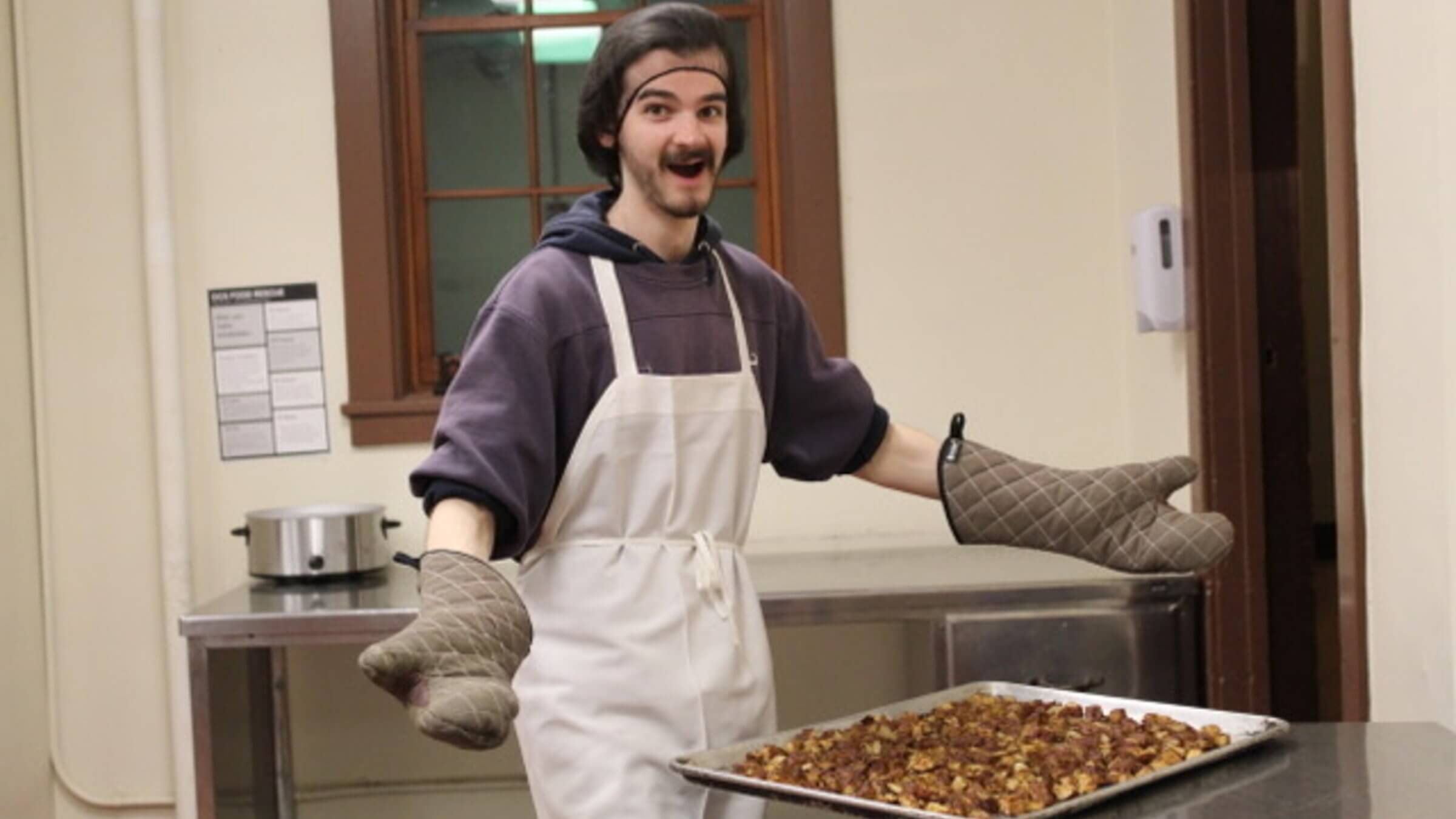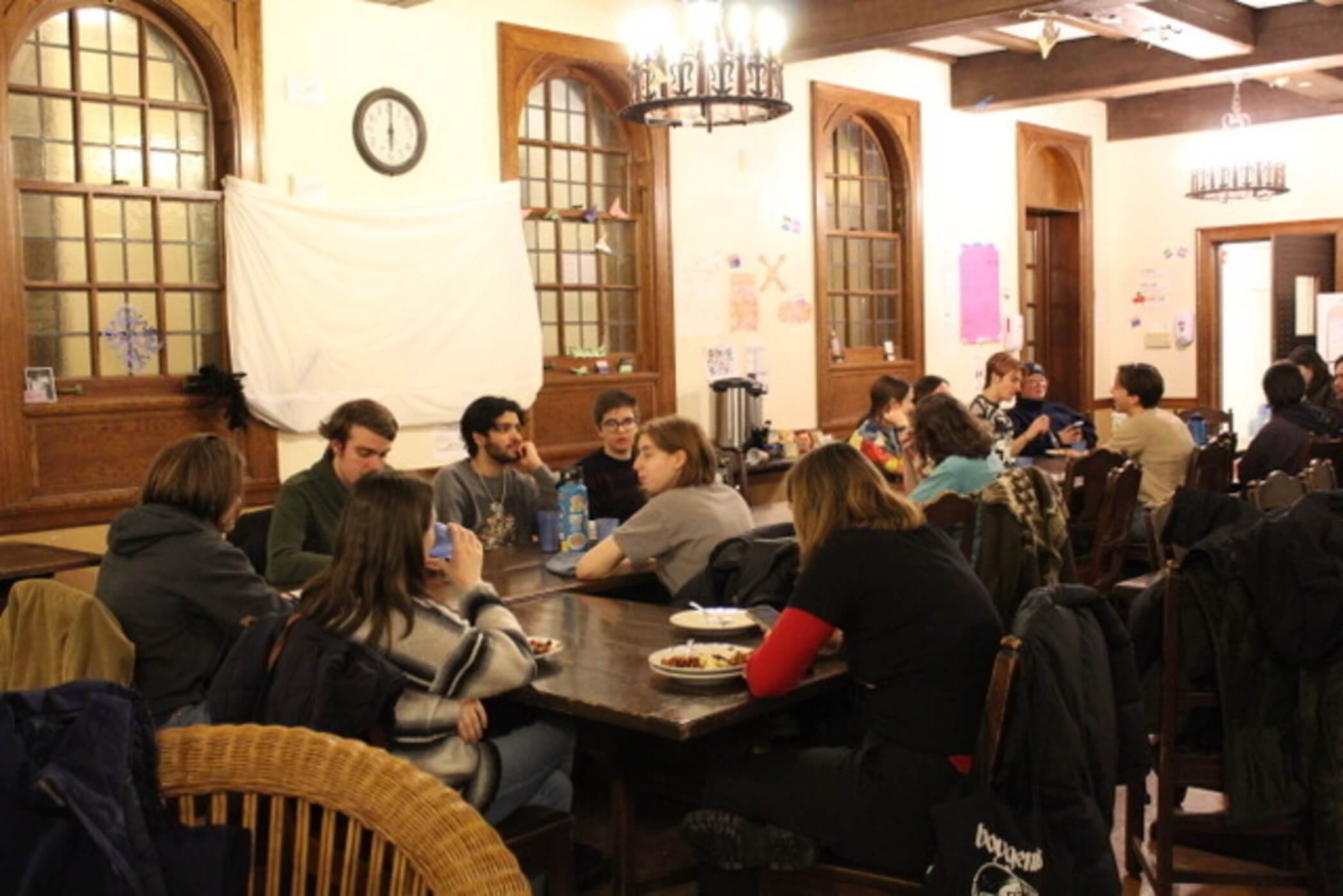As war rages in Mideast, Oberlin students revived a kosher-halal dining co-op
But the future of the project is uncertain

Member of Oberlin College’s kosher halal co-op, Gabe Liftman, 19, prepared potatoes for one of the group’s meals in January. Courtesy of Elliot Diaz
Founded more than half a century ago as student-run dining cooperative, Oberlin College’s kosher co-op morphed into a kosher-halal co-op in 1995, a place where Jewish and Muslim students cooked and ate together. It shuttered in 2021 after the liberal arts college opened its own kosher dining hall — which also serves halal options — and declined to renew the co-op’s lease on an industrial campus kitchen.
But in January, as the Israel-Hamas war raged and as Oberlin opened for its one-month “winter term,” a group of students and alumni decided to use the time between semesters to revive the co-op and bring Jewish and Muslim students together again for breakfast, lunch and dinner.
The project at the Ohio school, known for its socially conscious history and student body, attracted 32 diners — 16 Jews, three Muslims, and 11 who are neither but have an interest in religious studies or — in the case of one student — appreciated the co-op’s proximity to her room. Each paid $50 a week for each of the four weeks of the four-week term, significantly less than Oberlin’s meal plan.
Calling the time-limited revival a success — it served almost as many students as it did before it closed three years ago — organizers are now trying to bring the co-op back permanently as a model for peaceful, nutritive coexistence at the school, where about 22% of students are Jewish, according to Hillel. (Oberlin was not able to provide figures for the number of Muslim students before publication time.)

One of those organizers, Elliot Diaz, a 23-year-old who graduated from Oberlin last spring, said fraught conversations about the Middle East now roiling American campus life go a little easier among co-op members.
“People see each other more as full human beings,” said Diaz, a Jewish alumnus who majored in Latin, history and Jewish studies. “They’re approached with a lot more grace and a lot more care because these are the people that you’re cooking lunch with, and the person you’re going to see at dinner tomorrow.”
Chahine Said, 18, a Muslim co-op member from Morocco who swims for Oberlin, hasn’t been in the co-op when difficult conversations about Israel and Gaza have arisen. But he said differences among students in the co-op are handled with grace.
“Everyone has so much respect for me,” Said said. “Whether they’re Jewish or just Americans. I feel like we’re in such harmony.”
That spirit is harder to reproduce in your average college cafeteria, said Diaz. At the co-op, members are affirming their own religious practice as they learn about the practices of others. “It’s lovely to see the understanding that happens pretty casually through cooking and beginning friendships while doing it.”
How to revive a kosher co-op
The co-op’s one-month revival was made possible by the students of Oberlin’s Asia House, a dorm and dining hall for students interested in Asian cultures. They weren’t using their kitchen over the winter term, and invited the newly revived kosher-halal group to make themselves at home.
It wasn’t too hard to ready the kitchen for halal cuisine, said Rabba Amalia Haas, the senior Jewish educator at Oberlin’s Hillel. Haas, who belonged to the co-op when she was an Oberlin undergraduate, connected current students with an imam she knew through the Center for Spiritual Care at the Cleveland Clinic, Harun Çekiç, who helped assure the co-op followed the rules of halal. Alcohol, for example, is forbidden, so kiddush is made with grape juice.
Many Muslims consider most, but not all, kosher cooking to be halal. (The reverse is not true — halal is not acceptable for kosher-keeping Jews.)
It took a full day’s work to make the Asia House kitchen kosher, including kashering cooking equipment and surfaces with extreme heat.
“We had a team of people blow torching,” Haas said. “Then, we had other people scrubbing things clean and boiling them.”
Several students saw the revival of the co-op as a passion project, including junior Elijah Freiman, 22, whose uncle, Rabbi Shimon Brand, supervised the co-op a generation ago. But Freiman was also inspired by a story about his mother, Amy Aaland, the former executive director of Yale’s Hillel, who died of cancer in 2011. Her family knew she had welcomed observant Muslim students to share in the Hillel’s kosher food. But after her death they learned something more.
One of those Muslim students, unmasked in The New York Times Magazine as a former member of the Taliban, stopped coming to Hillel and isolated himself on campus. Writing his condolences, he told Aaland’s family that she had arranged for kosher food to be sent to his room three times a day, so he could keep halal.
“Kinship,” Freiman said his mother understood, is “the people that we eat with.”
Saving the co-op — again
For the co-op to resume operations, it needs a home — with an industrial kitchen.
Diaz launched a PayPal fundraiser in December, asking for $18,000 to help cover the costs of new kitchen equipment to replace what could not be koshered, kosher food products, Jummah lunches (the traditional Muslim Friday meal), Shabbat meals, scholarships for students to cover membership and wages for the alumnus who would manage the enterprise.
The co-op raised around $12,500 from 65 PayPal donations, along with other donations and pledges, mostly from co-op alumni and rabbis, and broke even for the winter term. Organizers are continuing to fundraise in hopes of landing a suitable space on-campus or off.
Freiman said he and the other organizers are considering two ways to ensure a future for the co-op.
They could widen their fundraising base among Jews and Muslims to retrofit a space in the town of Oberlin. That would involve paying an “exemption” fee to the college to allow students to bypass the dining plan, and hundreds of thousands of dollars for renovations.
A more preferable option, he said, would be for the co-op to stay on campus, and operate as a member of the Oberlin Student Cooperative Association, which oversees the college’s other dining co-ops, and would give them a rent-free home.
“We might be able to negotiate something with the college,” Freiman said. He can picture the co-op in historic Talcott Hall, the dorm with the dining hall that serves kosher and halal meals, and where the co-op operated before its demise.
Andrea Simakis, the director of media relations at Oberlin, said in an email that while the institution is “excited by, and supportive of” the co-op’s revival, the college’s official position is that it should arrange to use one of the five on-campus kitchens used by other meal co-ops on campus, which includes the Third-World Co-Op, which describes itself as “an intentional dining safer-space for Students of Color.”
But champions of the kosher-halal co-op said those spaces are taken.
Still, Freiman said he’s optimistic that Oberlin’s leaders will hear stories from the winter term experiment, and understand the co-op’s value to the university and its students.
“It deserves its own little corner of campus,” he said.















